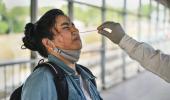'A patient visits for any other treatment, but a routine Covid test finds him to be positive.'
'Not only are they, but their whole family is also coming out to be positive.'

The Omicron sub-lineage BA.2.12.1, which is causing a surge in COVID-19 cases in the National Capital Region, has a mutation in the spike protein similar to the one found only in the Delta lineage.
Whether this causes any severity in infections is to be seen, but so far, clinicians claim, most Covid-positive cases are asymptomatic or mild.
Speaking to Business Standard, Dr Shahid Jameel, a senior research fellow at Green Templeton College at Oxford University, said Omicron now has two main lineages – BA.1 and BA.2, both with several sub-lineages. "As a group, BA.2 spreads about 20 per cent better than BA.1," he said.
"There are two key mutations in the spike (protein) in BA.2.12.1 that are missing from BA.2.12 and other sub-lineages. These are L452Q and S704L. Of these, a similar (not identical) mutation, L452R, is found only in the Delta lineage," Dr Jameel said.
The senior virologist said this mutation in the receptor binding domain was responsible for antibody evasion and better receptor binding of the Delta variant. "It remains to be seen if BA.2.12.1 will behave similarly. But it has become the fastest growing variant in the Northeast USA. The data for India is scant," he added.
So, will this mutation in BA.2.12.1 lead to pulmonary infections, which were common during the second Covid wave led by the Delta variant?
"We can't extrapolate," Dr Jameel said. "Further, the population immunity due to prior exposure and vaccination were very different at the time Delta arrived compared to now."
Pulmonary or lung infections during the second wave had created demand for medical oxygen across India, and many patients had turned severe and landed in intensive care units.
Dr T Jacob John, senior virologist and former head of the departments of clinical virology and microbiology at the Christian Medical College, Vellore, too, felt that the situation now is quite different from that during the second wave.
"Any variant or mutation could have led to a fourth wave easily if this had been two years back. But now the population has hybrid immunity -- from infections and also vaccines. Therefore, we are better placed for mutations in the virus," Dr John said, adding that the situation, however, needs to be closely monitored.
"I would say that if cases in any particular region reach 10 per cent of the peak caseload, then we can start to think that the disease is no longer in the endemic phase. So, we have to keep up the vigil and continue to monitor," Dr John added.
"As of now, we do not have much epidemiological rationale for a fourth wave to occur soon," Dr John stated.
Doctors say Covid-positive cases are now often detected by accident.
"A patient visits for any other treatment, but a routine Covid test finds him to be positive. So, there is also a need to define which cases we will term as Covid positive cases," says Dr Shuchin Bajaj, founder director, Ujala Cygnus Group of Hospitals in Delhi.
Dr Vikas Maurya, director and head of department (pulmonology), Fortis Hospital Shalimar Bagh, said: "We have seen that in the last few days, there has been an increase in the number of patients presenting with influenza-like symptoms. The increase is somewhere around 30 per cent."
All these patients are getting the Covid test done, and as Dr Maurya says, one in 10 patients is testing positive.
"Not only are they, but their whole family is also coming out to be positive. There is a slight increase in the number of patients presenting with this," Dr Maurya added.
Most patients admitted in hospitals with Covid were not very severe, Dr Maurya said, but some required oxygen support.
"Those patients who are getting admitted to the hospital at present are not very severe. Those who are found to be Covid positive are in the moderate category with some lung involvement. They are on oxygen support but are not requiring very high oxygen or ventilator support," Dr Maurya explained.
"So, at present, no patient with severe Covid has been admitted to the hospital. We have to keep a careful watch on the number of patients coming out and continue with Covid-appropriate behaviour."











 © 2025
© 2025